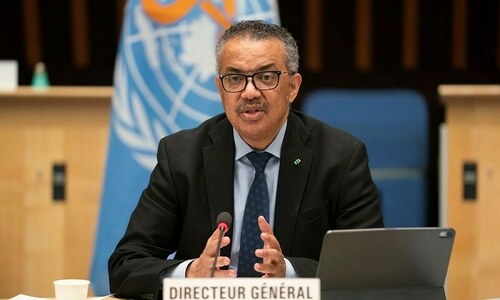
KABUL: Only five hospitals in Afghanistan still offer Covid-19 treatment, with 33 others having been forced to close in recent months for lack of doctors, medicines and even heating. This comes as the economically devastated nation is hit by a steep rise in the number of reported coronavirus cases.
At Kabul’s only Covid-19 treatment hospital, staff can only heat the building at night because of lack of fuel, even as winter temperatures drop below freezing during the day. Patients are bundled under heavy blankets.
Its director, Dr Mohammed Gul Liwal, said they need everything, from oxygen to medicine supplies.
The facility, called the Afghan Japan Communicable Disease Hospital, has 100 beds. The Covid-19 ward is almost always full as the virus rages.
Healthcare system’s near-collapse deepening humanitarian crisis in the country
Before late January, the hospital was getting one or two new coronavirus patients a day. In the past two weeks, 10 to 12 new patients have been admitted daily, he said.
The situation is worsening day by day, said Liwal, speaking inside a chilly conference room. Since the Taliban takeover of the country six months ago, hospital employees have received only one month’s salary, in December.
Afghanistan’s healthcare system, which survived for nearly two decades almost entirely on international donor funding, has been devastated since the Taliban returned to power in mid-August, amid the chaotic end to the 20-year US-led intervention. Afghanistan’s economy crashed after nearly $10 billion in assets abroad were frozen and financial aid to the government was largely halted.
The health system’s near-collapse has only worsened the humanitarian crisis in the country. Roughly 90 per cent of the population has fallen below the poverty level, and with families barely able to afford food, at least a million children are threatened with starvation.
The omicron variant is hitting Afghanistan hard, Liwal said, but he admits it is just a guess because the country is still waiting for kits that test specifically for the variant. “They were supposed to arrive before the end of last month,” said Public Health Ministry spokesman Dr Javid Hazhir. The World Health Organisation now says Afghanistan will get the kits by the end of February.
The organisation says that between Jan 30 and Feb 5, public laboratories in Afghanistan tested 8,496 samples, of which nearly half were positive for Covid-19. Those numbers translate into a 47. 4pc positivity rate, the world health body said.
As of Tuesday, WHO recorded 7,442 deaths and close to 167,000 infections since the start of the pandemic almost two years ago.
Published in Dawn, February 11th, 2022











































